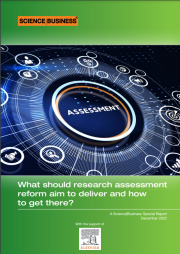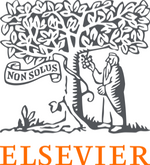After years of debate, research assessment reform has become an urgent priority for policy makers and science organisations alike, both in Europe and beyond. But what are the most effective ways forward? How can all key stakeholders contribute to shaping a new system?
Sponsored by Elsevier.
Get your free copy

Supported by Elsevier

Assessment has become an essential part of the research process, pivotal to measuring policy goals, deciding on programme budgets, project selection, funding awards and career development. Since the 2008 financial crash, economic constraints on public funding have intensified, leading to increased political demands for the scientific community to measure the broader impact it has in order to demonstrate its value to society.
At the same time, there is a growing consensus – both in Europe and elsewhere in the world – that the current assessment system needs to be rethought for an age of open science, big data, digitalisation and the demand for cross-disciplinary methods and skills. There are calls to improve the use of metrics, better balance quantitative and qualitative factors, and broaden the scope of assessment to reflect the full diversity of inputs, outputs and practices in 21st century science. The ultimate goal? To move away from inappropriate use of journal- and publication-based metrics in research assessment, towards a combination of metrics and narratives that reflect the value of research outputs and (researchers’ activities) in a more nuanced way.
Inevitably, this raises the question of what happens next, and through which channels, in terms of implementation. Can the shift from rhetoric to action be driven by genuine innovation and experimentation, towards an agreed set of defined and pragmatic outcomes? How best to reach beyond academia to involve the full R&I community? And while Europe embarks on its own transformation, is there truly a global appetite for change and willingness to align approaches?
This paper summarises a roundtable discussion on Expected outcomes: What should research assessment reform aim to deliver and how to get there? among representatives from the EU institutions, government agencies, funders and international experts in the field. It was hosted on 25 October 2022 by Science|Business in partnership with Elsevier, an information and analytics provider for research and health. This report is ultimately a product of Science|Business.

 A unique international forum for public research organisations and companies to connect their external engagement with strategic interests around their R&D system.
A unique international forum for public research organisations and companies to connect their external engagement with strategic interests around their R&D system.